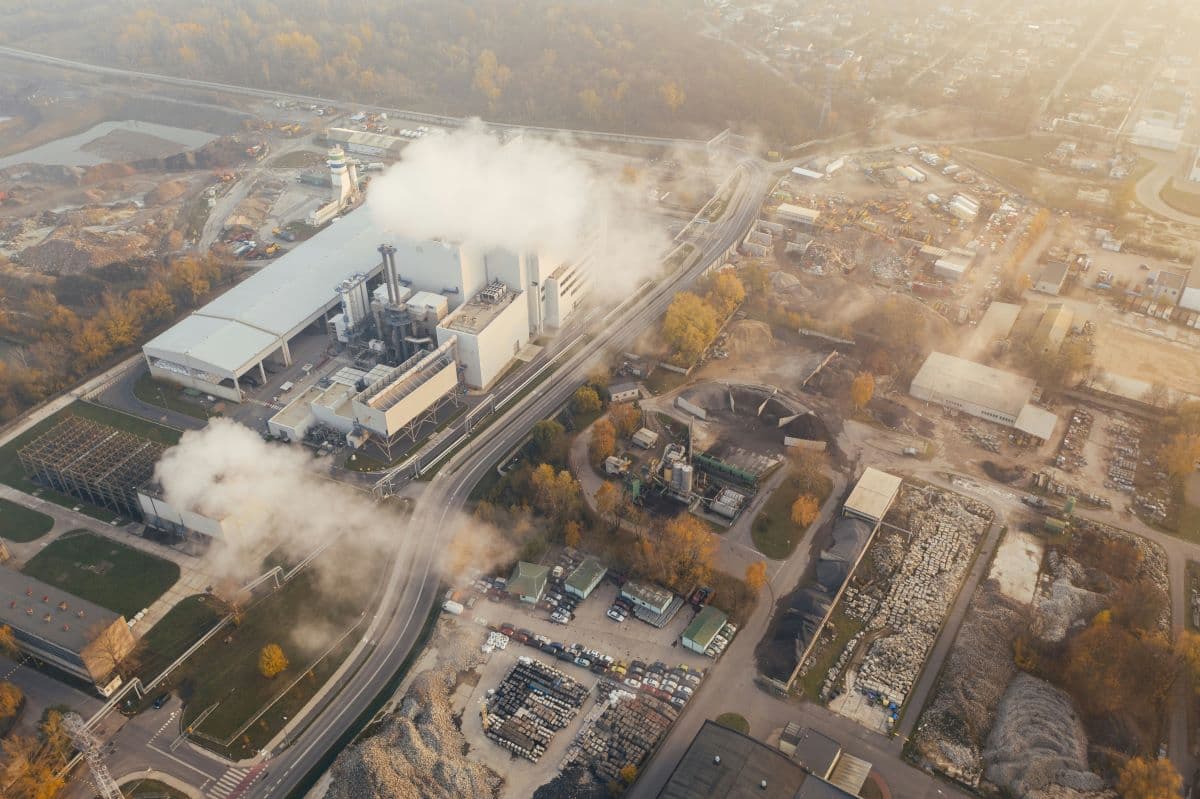From Data to Action: Strategies for Scope 3 Emissions Reduction in Manufacturing
Go to all updates
Over the past few years, there has been a substantial shift in the global debate on climate change, with a significant emphasis placed on the urgent need for decarbonization across all industries. Despite the fact that Scope 1 and Scope 2 emissions, which are mostly caused by direct operations and purchased energy, have received a lot of attention, Scope 3 emissions provide a challenge that is both distinct and frequently ignored. Manufacturers in Africa have a big challenge in the form of these emissions, which include the indirect emissions that are related to the value chain of a company and include activities that occur both upstream and downstream.
Manufacturing plays a significant part in the economic development of Africa since it is responsible for the creation of employment opportunities and the expansion of the gross domestic product. With that being said, the sector is also responsible for a sizeable percentage of the continent's greenhouse gas emissions, mostly as a result of the manufacture and transportation of commodities. In order to effectively address Scope 3 emissions in the manufacturing sector, it is necessary to have a complete grasp of the intricacies involved and to adopt focused strategies to achieve meaningful reduction efforts.
The availability of data and the quality of that data is one of the most essential issues in the process of addressing Scope 3 emissions. Scope 3 emissions entail a substantial number of variables that are spread out throughout a variety of supply chains, in contrast to Scope 1 and Scope 2 emissions, which are relatively simpler to measure and keep track of. As a result of the limited infrastructure and resources available in many African countries, there is a lack of comprehensive data-gathering procedures. This makes it difficult for manufacturers to accurately estimate and analyze their indirect emissions.
It is necessary for African firms to make investments in the enhancement of their data management systems and capacities to overcome this obstacle. This involves the establishment of comprehensive monitoring and reporting mechanisms, the utilization of technological solutions for the gathering and analysis of data, and the promotion of collaboration with suppliers to improve transparency and accountability. Manufacturers can identify hotspots, establish reduction targets, and put targeted interventions into place to bring about significant change if they obtain data that is accurate and reliable regarding Scope 3 emissions.
In addition, manufacturers can utilize partnerships and collaborations to collectively manage Scope 3 emissions. Because of the interrelated structure of supply chains, various industry sectors, government agencies, and non-profit groups need to work together to drive systemic change. The acceleration of efforts to reduce Scope 3 emissions can be facilitated by initiatives such as industry coalitions, public-private partnerships, and sector-specific alliances. These initiatives can facilitate the exchange of knowledge, the pooling of resources, and the adoption of best practices.
There is a need for manufacturers to prioritize innovation and technology adoption in addition to data-driven approaches and collaborative initiatives to achieve significant reductions in Scope 3 emissions. This involves making investments in technologies that are efficient with energy, making the switch to renewable energy sources, and optimizing manufacturing processes to reduce waste and pollution. Not only can businesses lessen their impact on the environment by embracing
innovation, but they can also increase their operational efficiency and their ability to compete in the global market.
Also, special economic zones like Ghana's Dawa Industrial Zone give manufacturers a unique opportunity to make innovation and technology adoption a priority in their business. Companies that want to lower their Scope 3 emissions can start up in these zones, which have infrastructure that supports sustainable practices and specific rewards for doing so. These zones make it easier for businesses to switch to greener ways of doing things by creating a setting that is good for using renewable energy sources and new ways of making things.
In addition, manufacturers can investigate the ideas of circular economies as a means of lowering this category of emissions. A complete approach to resource management is provided by the circular economy, which emphasizes the recycling, remanufacturing, and reuse of products and resources. Manufacturers can reduce the negative impact that their operations have on the environment while simultaneously generating new revenue streams and prospects for business by developing products with lifetime and recyclability under consideration.
In spite of the difficulties and complexities involved, lowering Scope 3 emissions in manufacturing gives a huge opportunity for African nations to align themselves with global climate goals while simultaneously encouraging sustainable economic growth. The adoption of data-driven strategies, the promotion of collaboration, the acceptance of innovation, and the adoption of concepts of circular economies are all ways in which manufacturers may play a crucial role in driving the transition to a future with lower carbon emissions.
In addition, it is essential for African industries to comprehend that lowering Scope 3 emissions offers advantages that extend beyond the protection of the environment. Reducing indirect emissions can accomplish a number of goals, including making businesses less susceptible to hazards associated with climate change, enhancing the reputation of their brand, and opening up new markets and investment opportunities. There is an increasing emphasis on sustainability all around the world, and businesses that demonstrate that they are serious about reducing their carbon effect may have an advantage in the market. Products and services that are friendly to the environment are becoming increasingly in demand among consumers, and businesses that place a priority on sustainability are more likely to attract consumers who are environmentally concerned. Additionally, by adopting environmentally responsible business methods, African manufacturers have the opportunity to establish partnerships and collaborations with businesses that have similar values and are of a similar mindset, which can result in additional growth and innovation within their industry.
In addition, governments and legislators play a significant role in assisting manufacturers in reducing Scope 3 emissions. Governments can take action by enacting laws, incentives, and regulations that encourage the use of environmentally responsible manufacturing practices. In order to accomplish this, we may provide financial incentives for making houses and businesses more energy efficient, invest money in the construction of infrastructure for green energy, and establish methods for pricing carbon so that everyone is aware of how much it costs to discharge pollution. In addition, governments can collaborate with manufacturers to formulate rules and regulations that encourage the utilization of renewable energy sources and practices that are friendly to the environment throughout the whole supply chain. When governments and
manufacturers collaborate, they have the potential to lower Scope 3 emissions and bring about positive change in the industry. This can be accomplished by making it easier to reduce emissions. The government can also invest money in research and development projects to assist in the improvement of environmentally friendly technologies. This has the potential to generate new ideas and assist businesses in transitioning to manufacturing methods that are less harmful to the environment.
Governments and lawmakers are also very important when it comes to helping businesses cut down on Scope 3 emissions. This is especially true for companies that work in special economic zones like Ghana's Dawa Industrial Zone. For businesses to prioritize reducing emissions, governments can support them by making policies that back them and offering financial incentives for using environmentally friendly manufacturing methods. Guidelines that encourage the use of renewable energy sources and environmentally friendly production methods can be made when governments and industrial zones work together. This will lower emissions even more.
In order to enhance the capabilities of manufacturers to effectively manage Scope 3 emissions, it is necessary to implement programs that not only enhance their skills but also facilitate the sharing of information. This can be accomplished by providing manufacturers with access to specialists, as well as training and technical assistance, to equip them with the tools and resources they require to address the complex issues surrounding the reduction of emissions. The creation of advice papers for certain industries, the hosting of workshops and seminars, and the establishment of peer-to-peer learning networks are all examples of this type of activity. In addition, these initiatives may involve the establishment of platforms that enable firms to share their most effective strategies and examples of successful reductions in emissions. In addition, governments and industry associations can work together to design rules and regulations that give financial assistance for the implementation of sustainable practices and provide incentives to businesses to prioritize the reduction of emissions.
It is also possible for African producers to gain a great deal of knowledge from case studies and success stories originating in other regions of the world. Manufacturing organizations can learn how to develop effective strategies and put them into action by listening to the best practices and lessons gained by companies that have effectively reduced their Scope 3 emissions and sharing those ideas with other manufacturers. Through the exchange of information, efforts to reduce emissions and foster the development of innovative ideas in the industrial sector in Africa can be accelerated. By working together with industry professionals, African producers have the opportunity to acquire vital insights into the implementation of sustainable practices that are adapted to their particular sectors. Furthermore, the promotion of information sharing via the inclusion of case studies and success stories from all over the world has the potential to stimulate the development of creative solutions and speed up the process of reducing emissions in Africa's industrial sector.
All in all, to tackle Scope 3 emissions in African manufacturing, it is necessary to take a comprehensive approach. Industries, governments, and special economic zones like Ghana's Dawa Industrial Zone should work together on focused strategies that are based on correct data. These zones should also offer incentives for green practices. Technology advancements, circular economies, and government backing must be given top priority for protecting the environment, as well as for keeping the economy strong and keeping up with the competition in the market. African
manufacturers can help the world reach its climate goals, improve their brand's image, and get into new markets by putting money into programs that teach them new skills and manage data. This helps the economy grow responsibly while lowering emissions.
More
updates

How Industrial Parks Are Powering Economic Growth in Africa
Blog∙30th April, 2025

Addressing The Infrastructure Gaps in Sub-Saharan Africa
Blog∙11th March, 2025

Regional vs. National Approaches to Trade Facilitation: Which is More Effective for Africa?
Blog∙11th December, 2024

Earn Big with Dawa Refer & Earn: Unlock Lucrative Rewards for Every Business You Refer!
Blog∙13th November, 2024

Leapfrogging the Growth Trap: Policy Initiatives for Developing Economies in a Globalized World
Blog∙4th October, 2024
